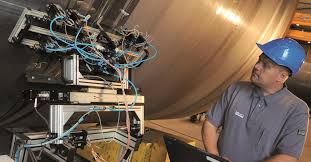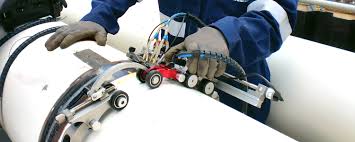Nondestructive testing (NDT) in the marine industry is a crucial aspect of ensuring the safety and reliability of maritime assets. In Egypt, where the marine industry is a key sector of the economy, the future of inspections lies in the advancement of nondestructive testing ndt weld testing techniques. As the demand for efficient and effective inspection methods continues to grow, the implementation of NDT in the maritime sector is becoming increasingly essential. This paper explores the current landscape of nondestructive testing in the marine industry in Egypt and offers insights into its future implications and potentials.
Nondestructive testing (NDT) plays a vital role in the marine industry in Egypt, ensuring the safety and reliability of marine structures and components. NDT techniques such as ultrasonic testing, magnetic particle testing, and radiographic testing are used to detect flaws, cracks, and defects in various marine equipment and infrastructure. As the marine industry aws ndt in Egypt continues to grow and modernize, the demand for NDT services is expected to increase. This is especially true as the country invests in the expansion and maintenance of its ports, shipyards, and offshore facilities. NDT will be crucial in ensuring that these critical marine assets are in optimal condition and comply with international safety and quality standards. The future of inspections in the marine industry in Egypt will likely see a greater use of advanced NDT technologies, such as phased array ultrasonic testing and computed radiography, to provide more detailed and accurate inspections. Additionally, there may be a growing emphasis on implementing predictive maintenance strategies, where NDT plays a key role in identifying potential issues before they escalate into costly repairs or accidents. Overall, NDT will continue to be an indispensable tool in the marine industry in Egypt, helping to maintain the integrity and performance of marine assets while ensuring the safety of workers and the environment.
Advantages of Using Nondestructive Testing in Marine Egypt

Nondestructive testing in marine Egypt offers several advantages. It helps in detecting defects or potential problems in marine structures without causing any damage, allowing for timely maintenance and repair. This can help prevent potential accidents and minimize costly downtime. Additionally, nondestructive testing can provide valuable information on the condition and integrity of marine vessels and infrastructure, helping to ensure they meet industry safety and regulatory standards. It also allows for more efficient and ndt inspection services cost-effective maintenance planning and can extend the lifespan of marine equipment. Overall, the use of nondestructive testing in marine Egypt can contribute to improved safety, reliability, and cost savings in the marine industry.
The Role of Nondestructive Testing in Ensuring Marine Safety in Egypt

Nondestructive testing plays a crucial role in ensuring marine safety in Egypt by detecting potential defects and weaknesses in maritime structures, equipment, and vessels without causing damage to the integrity of the materials being inspected. This allows for timely identification and remediation of any issues that could compromise the safety and functionality of marine assets. By conducting regular nondestructive testing, such as ultrasonic testing, magnetic particle testing, and visual inspection, the marine industry in Egypt can maintain high safety standards and prevent accidents or failures that could have detrimental environmental and economic consequences. Additionally, nondestructive testing helps to extend the lifespan of marine components and infrastructure, ultimately contributing to the overall efficiency and sustainability of Egypt's maritime operations.
How Nondestructive Testing Contributes to Marine Infrastructure Quality in Egypt

Nondestructive testing (NDT) contributes to the quality of marine infrastructure in Egypt by enabling the detection of defects and structural weaknesses without causing damage to the structure itself. This allows for early identification of potential issues, promoting safety and durability of marine infrastructure such as bridges, ports, and offshore installations. NDT methods commonly used in the marine industry include ultrasonic testing, radiographic testing, magnetic particle testing, and visual inspection. By implementing NDT, Egypt can ensure the integrity and reliability of its marine infrastructure, ultimately contributing to the safety and efficiency of its maritime activities.
Challenges and Solutions for Implementing Nondestructive Testing in Marine Egypt
ndt weld testing
Challenges for implementing nondestructive testing in Marine Egypt include the lack of standardized procedures and guidelines, limited availability of advanced equipment and technology, and the need for trained and qualified personnel. Additionally, there may be resistance to change and a lack of awareness about the benefits of nondestructive testing. Solutions for these challenges include the development of specific standards and regulations for nondestructive testing in the marine industry, investment in modern equipment and technology, and the establishment of training programs to educate and certify personnel in nondestructive testing techniques. Collaboration with international organizations and experts in the field can also help to improve the implementation of nondestructive testing in Marine Egypt.
The Impact of Nondestructive Testing on Marine Industry in Egypt
Nondestructive testing in the marine industry in Egypt has significantly contributed to ensuring the safety and reliability of maritime infrastructure and vessels. By employing various NDT methods such as ultrasonic testing, magnetic particle testing, and radiographic testing, it has become possible to detect defects and discontinuities in critical components without causing damage to the structures. The implementation of NDT in the marine industry has led to improved inspection and maintenance practices, resulting in enhanced operational efficiency and minimized downtime for vessels and offshore platforms. Furthermore, NDT has played a crucial role in compliance with international safety standards and regulations, thereby bolstering Egypt's position in the global maritime market. Overall, the impact of nondestructive testing on the marine industry in Egypt has been profound, ensuring the integrity and longevity of marine structures and contributing to the country's maritime development.
Nondestructive Testing Techniques Used for Marine Structures in Egypt
ndt inspection services
Nondestructive testing techniques used for marine structures in Egypt include ultrasonic testing, magnetic particle testing, and visual testing. These techniques are employed to assess the integrity and quality of welds, materials, and structures in order to ensure they meet safety and quality standards. Additionally, radiographic testing and eddy current testing are also utilized to detect defects and corrosion in marine structures. These nondestructive testing methods help to prevent potential hazards and ensure the reliable performance of marine structures in Egyptian waterways.
The Future of Nondestructive Testing in Marine Egypt
The future of nondestructive testing (NDT) in the marine industry in Egypt is expected to involve the continued integration of advanced technologies and methodologies to ensure the safety and integrity of maritime infrastructure. This will include the use of techniques such as advanced ultrasonic testing, phased array ultrasonics, eddy current testing, and other nonintrusive inspection methods to detect flaws, corrosion, and structural weaknesses in marine vessels, offshore platforms, pipelines, and other critical infrastructure. Additionally, the adoption of digital NDT technologies and data analytics will enable more efficient and reliable inspection processes, reducing downtime and maintenance costs for marine operators. The implementation of NDT standards and regulations will also play a key role in enhancing the quality and reliability of inspections in the marine sector in Egypt. Overall, the future of NDT in Marine Egypt is poised to contribute to the overall safety, efficiency, and sustainability of the country's maritime industry.
